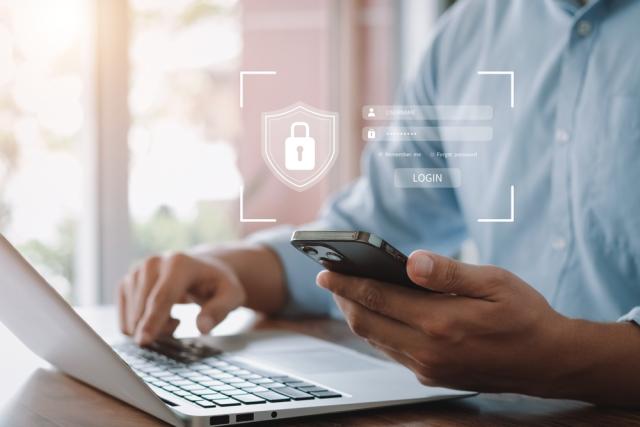
Cybersecurity needs to be a top concern, experts said during the Geophysical Society of Houston luncheon. (Source: Shutterstock)
While the Internet of Things (IoT) brings a host of advantages to fields like geophysics, it creates many potential points of entry for cyberattacks.
With people working both in the office and home, cybersecurity needs to be a top concern, experts said during a Geophysical Society of Houston luncheon on Jan. 18.
“The IoT is used in many facets of oil and gas—large file transfer, large data sets, communication and live monitoring of drilling,” consultant Leon Hamilton said.
The IoT functions through sensors connected to the web, and those devices create the IoT ecosystem. Those smart devices make possible real-time access to data, such as pipeline monitoring and drilling updates, which can increase productivity, reduce human labor and improve work safety, he said.
“The key to it all is that these devices work without anybody having to intervene,” he said.
And that’s possible with dependable components, which can deliver good results, he said.
“Some of the advantages of IoT are improved data collection, easy data accessibility. You can access it 24 hours a day from any place and in real-time,” he said. “When it comes to geophysical data, sometimes getting it and using it in real-time is more profitable to you in more ways than one.”
And while IoT and companion technologies like artificial intelligence and machine learning have made it possible for computers to do work that humans historically carried out, they are no replacement for expert analysis and critical thinking, Hamilton said.
“Smart machines are better than humans at analyzing data,” he said. “Smart machines can't do critical thinking. Smart machines can't have [a] face-to-face conversation with other smart people.”
Those machines can provide an output, he said, but it takes experts to evaluate the output alongside other variables that affect the decision-making process.
Challenges around IoT
IoT is not without its disadvantages and challenges.
One of the key disadvantages is that without a functional network, the IoT goes down, Hamilton said.
Legacy equipment and systems may not be compatible with the IoT, which can require expensive upgrades or integration efforts, he said. A further complication is the lack of formal standards around the IoT.
“As of right now, there is no standard that's in place, national or international, for IoT,” Hamilton said.
One of the bigger concerns around the IoT is its impact on the climate. Put simply, using the IoT means using more energy, which affects the climate, he said.
Research is being done into green IoT — ways to reduce emissions associated with the energy needed to fuel the IoT, he said.
Cybersecurity focus
Marianne Rauch, principal technical advisor at TGS, a firm that provides scientific data and intelligence to companies active in the energy sector, said that even if a company’s IT department creates a robust security system, it won’t help if the people at the company aren’t paying attention.
And security vulnerabilities increase when people work from home, as happened for so much of the COVID pandemic.
“That brings huge issues with security because the computers are not all in the network,” and as a consequence may not receive necessary security patches, she said. “These computers are much more open for cyberattacks.”
Exercising best practices, such as using tough-to-crack, lengthy passwords with a mix of upper- and lower-case letters along with numerals and special characters, are important, she said, referencing the Colonial Pipeline hack made possible through a compromised password.
She said one of the most useful techniques she had learned for creating a strong password was using a sentence or the first letters from words in a poem she had memorized, then inserting numbers and special characters within it.
“When you have 18 characters, if you have numbers, upper- and lower-case letters, symbols like I do, it takes seven quadrillion years to crack your password. So it's really very, very hard to break,” she said.
Recommended Reading
Crescent Point Divests Non-core Saskatchewan Assets to Saturn Oil & Gas
2024-05-07 - Crescent Point Energy is divesting non-core assets to boost its portfolio for long-term sustainability and repay debt.
Permian Resources Adds More Delaware Basin Acreage
2024-05-07 - Permian Resources also reported its integration of Earthstone Energy’s assets is ahead of schedule and raised expected annual synergies from the deal.
Evolution Petroleum Sees Production Uplift from SCOOP/STACK Deals
2024-05-07 - Evolution Petroleum said the company added 300 gross undeveloped locations and more than a dozen DUCs.
Riley Exploration Permian Closes Delaware Basin Bolt-on
2024-05-08 - Riley Exploration Permian said it added 13,900 acres and up to 25 net locations in Eddy County, New Mexico.
CGG, Baker Hughes Sign MOU for CCS Projects
2024-05-08 - The memorandum of understanding between CGG and Baker Hughes will bring the companies’ complimentary skillsets together to explore carbon capture and sequestration solutions.






